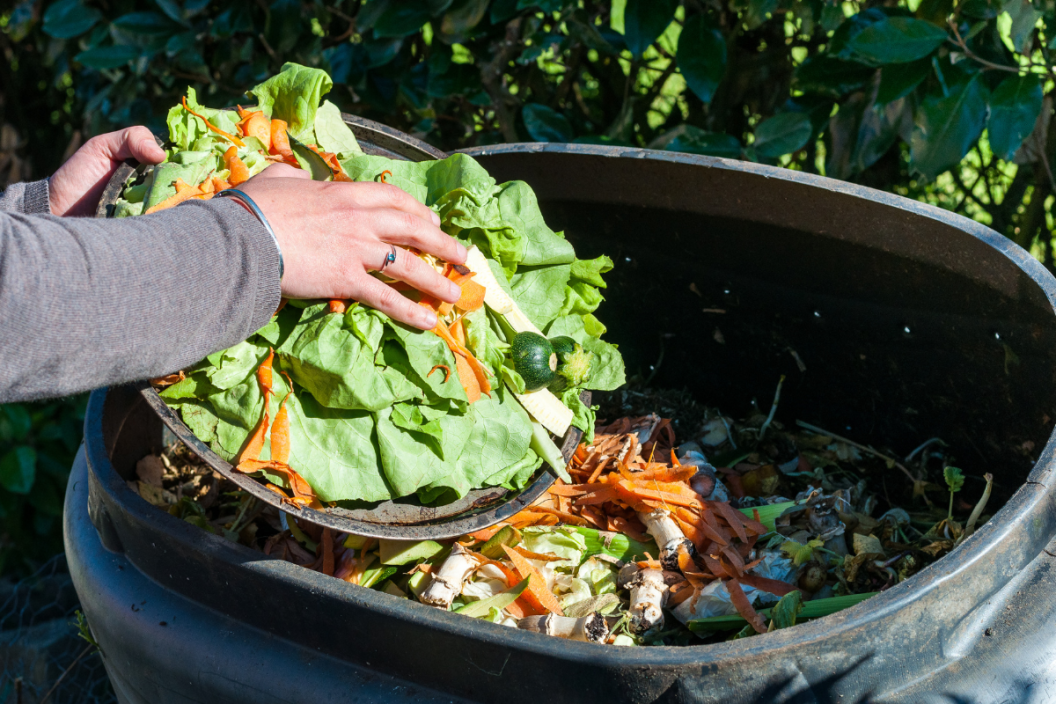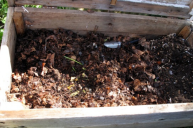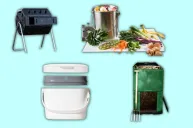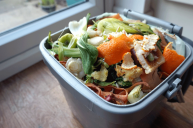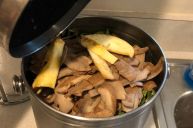Composting at home is one of the easiest ways to lessen your trash impact and create beautiful soil that can be added back into your landscape. More than 30% of one's waste per week is compostable according to the EPA, which means less money spent on garbage bags and less waste to bring to the curb. With this guide, you'll learn how to compost at home and help keep waste out of our landfills.
Videos by Wide Open Country
Why You Should Compost
Let's start by dispelling a crucial myth about compost: compost is not smelly! Truly, if you are properly tending your pile, you should have nothing but a deep, rich earthy smell wafting off of your compost. Besides having a pleasant smell, compost is one of the most valuable additions to any garden. With its high nutrient density, it helps alter the natural structure of your garden soil and convert it into something that is friable and fertile.
And a little bit goes a long way! Any addition of the composting process to a garden will introduce nitrogen, phosphorus, and potassium to make a balanced, pH-neutral soil in which to plant. Plus, adding backyard composting to your garden helps with water retention, suppresses plant diseases, and promotes the health of animals within the environment.
Not only will you be adding less waste into landfills, but you'll also be rewarded with a composting system rich in microorganisms and perfect for plant growth without the use of pesticides. Give the earthworms something to eat!
For a quick refresher, compost is decayed organic material that becomes plant fertilizer. You can compost everything from eggshells to coffee grounds to food scraps and food waste that easily break down in the composting bin. It'll turn into a perfect soil amendment for your garden.
So now the question is, how do you find this magically finished compost? Well, the good news is that you can easily and cheaply make it yourself at home.
To Compost in a Bin or Out in the Open?
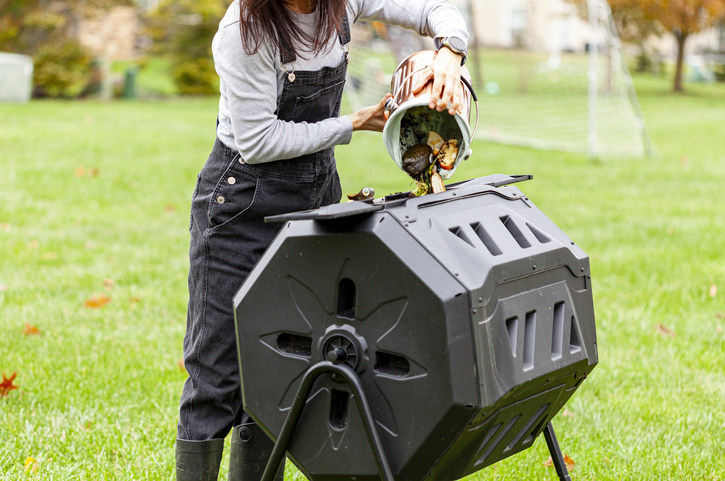
Getty Images
Your first decision after you've settled on the idea of making compost is to elect whether or not to use a fully enclosed bin for home composting. Although bins aren't necessary to decompose your organic waste, they do have their upsides for collecting kitchen scraps and yard waste.
Namely, they are aesthetically more pleasing if you have nearby neighbors and they make it easier for you to contain your pile in one place. Perhaps the best argument in favor of using a bin, however, is that it helps prevent critters from rooting around in your compost materials while the bunch is still decomposing and tracking scraps all over your yard.
On the other hand, if none of this concerns you, you can opt for another composting method such as an "open" compost pile that is built directly on the ground. This method, although not beautiful, is dirt cheap (pun intended) and makes it easy to turn over your compost pile to monitor its progress.
The decomposition process requires aeration as well as layering, so keep that in mind when troubleshooting what kind of compost you would like.
I personally use two different composting items, a kitchen composter which I keep under my sink, and a large box composter I keep at the corner of the yard. When cooking I add all my vegetable scraps to the under-the-sink bin. Every 2-3 weeks it fills up and I transfer it to the larger bin in the yard. At this most the composting process has already started, making this system work really well!
Carbon, Nitrogen, Water, and Oxygen
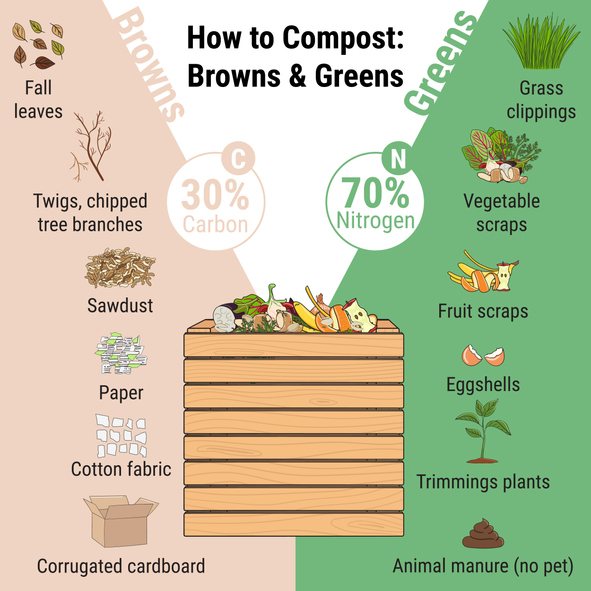
Getty Images
Outside of a spot to store your compost you only need four things:
- Carbon organic material (Brown materials such as sawdust, paper towels, cardboard, and egg cartons)
- Nitrogen organic material (Green materials such as plant trimmings, vegetable scraps, tea bags, and houseplants)
- Water
- Oxygen
Yes, it's as simple as that because compost is created from basic organic matter, which is essentially a composition of carbon and nitrogen. The key is simply to know how much of each to use. To start off, understand that "brown" means predominantly carbon and "green" indicates materials that are heavier in nitrogen.
For compost, you need approximately an equal ratio of nitrogen to carbon to create a healthy mix. Everything from grass clippings to tea leaves to wood chips is an excellent compost starter. Nature will help direct you as to whether or not you need more of either at any given time. You will just need to pay attention to how your garden beds respond to your composting materials.
Water and Oxygen
Besides carbon and nitrogen, the only two other ingredients you need to make rich soil are water and oxygen. If you add these two essential ingredients in the right proportions, you can have an active compost pile that can be ready in as little as four weeks.
To guide you in your watering efforts, make sure that your compost pile doesn't get any wetter than a wrung-out sponge. If you are able to squeeze a little drip of water out of the compost at the center of your pile then you're right on track.
You'll know, however, if your pile gets too damp as it will begin to smell. To fix that, simply turn over your oxygen-starved pile to aerate things and you'll be good to go.
What Not To Compost
While it might be tempting to throw everything but the kitchen sink into the compost bin, here are a few items that should not be added. Some of these create odor problems, attract pests, or introduce parasites and bacteria to your pile. A good rule of thumb is if it needs to be refrigerated, skip the compost bin.
- Dairy products
- Fats, grease, oil, or lard
- Meat, fish, and bones
- Dog and cat waste
- chemical-treated yard waste
Common Compost Problems
My compost is too wet
Compost can become soggy if you over-water or add too much nitrogen. Thankfully, this is an easy fix. All you need to do is add some brown (carbon) and turn your pile to allow oxygen to circulate.
Once your pile is back to 40 percent moisture or about the dampness of a wrung-out sponge, you're good to go.
I have pockets of nitrogen.
You'll know when you have a pocket of nitrogen when your compost begins to stink. Take a pitchfork and break up the clump and add in some extra carbon-rich material.
I accidentally threw in the wrong thing.
If you accidentally threw in an undesirable organic material like meat, fish, dairy products or grease, it's not the end of the world! Fish it out if you can. If you can't, cover it with brown material and turn it into the pile where it will break down.
Is My Compost Ready?
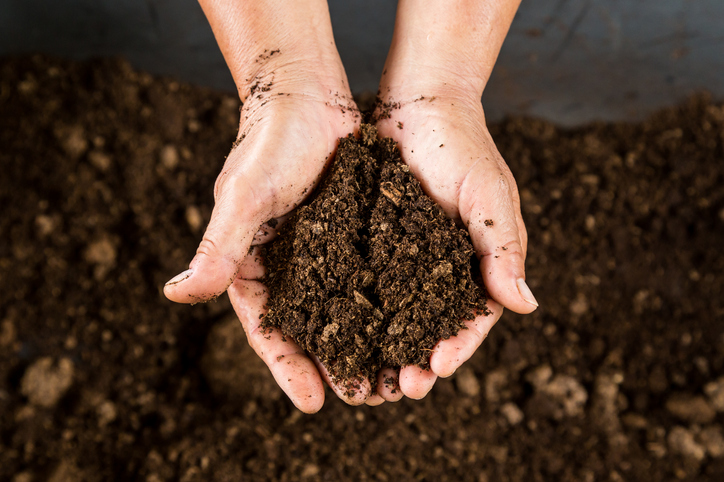
Getty Images
You'll know when you can introduce your organic material into your garden (or give to friends in your community garden) when the compost is a dark, crumbly, earth-smelling pile. For vigilant composters, this can occur in as little as four weeks, but for those who just want to let nature take its course, it may end up being six months to a year before you have your hands on gardening gold.
All it takes is time.
Products featured on Wide Open Eats are independently selected by our editors. However, when you buy something through our links, we may earn a commission.
